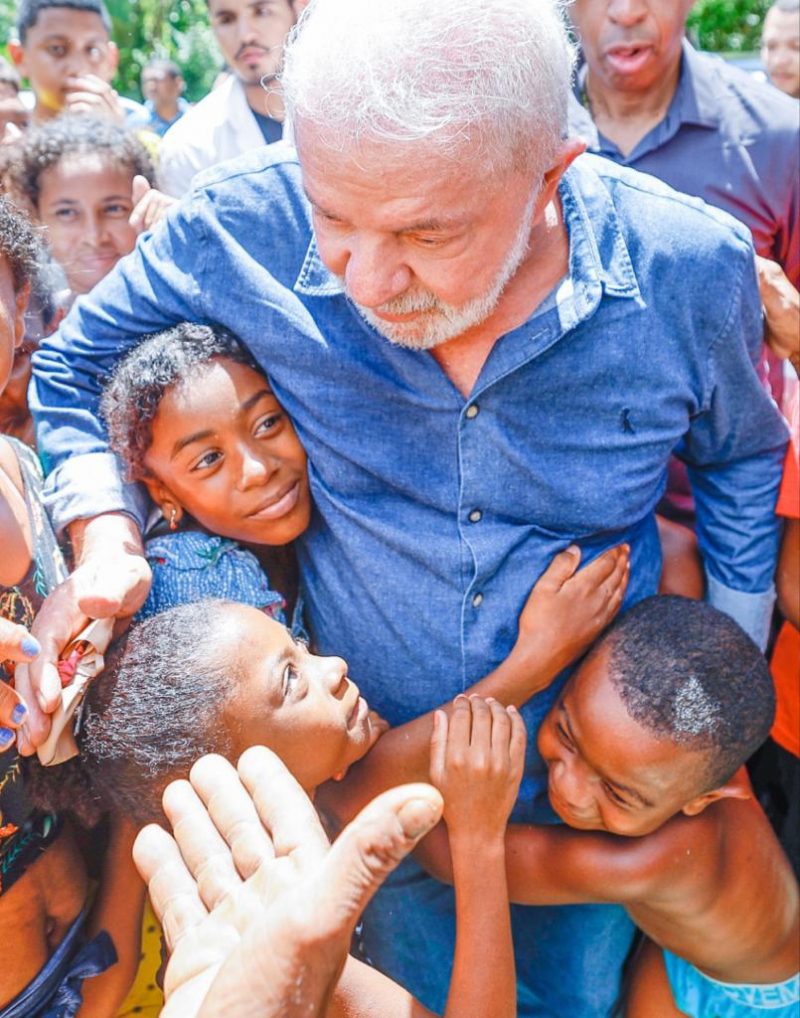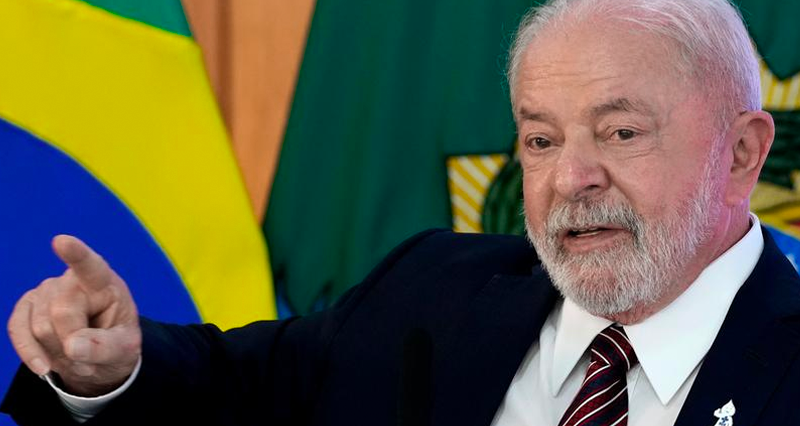Reporting from Natal, Brazil
This April 10, 2023, Luiz Inácio Lula da Silva completed his first 100 days of government in his third time elected. The first words of the Pernambucan president’s speech were “Brazil is back”, once again having a government that ensures care for those in greatest need among the Brazilian people. He also said that “Brazil returned to be once again a country without hunger.” Perhaps, this is the mark that stands out above others in Lula: a man sensitive to the most vital or urgent problems of humanity, and, within this framework, committed to ending the scourge of hunger for his people and the peoples of the world.
Also, among the main policies that his government carried out during the first months of his administration, Lula highlighted those that have served to prepare the ground for carrying out infrastructure works that were abandoned or ignored by the Bolsonaro government; as well as to take care of health, education, science and technology, culture, housing and public safety. Likewise, actions and programs were launched that helped to recover the dignity, citizenship and quality of life of the Brazilian people (food acquisition and school feeding programs; “Minha Casa Minha Vida” program, and “More Doctors”).
Below we highlight some of the challenges that Lula da Silva has had to face before even officially assuming the presidency.
Rebuild the country
The public policies promoted in previous Lula governments (2003-2011), among other things, had managed to get Brazil off the hunger map, with programs such as “Fome Zero” or “Bolsa Família”. They also enabled greater equity in access to education for sectors of society that have historically been excluded, such as the black population, indigenous peoples and people with disabilities. It is during the governments of Lula – and Dilma Rousseff (2012-2016), before the parliamentary coup against her – that Brazil established itself as a regional and global leader: The country stood out among the first economies in the world, its voice was “active and haughty” in every space for international dialogue and negotiation. However, the governments of Temer (2016-2018) and Bolsonaro (2018-2022) threw all this overboard. The setback of Brazil in those years has been evidenced in the numbers and, more importantly, in the reduction of the quality of life of millions of Brazilian men and women. The country also left an empty space behind on the international stage.

On how to get Brazil off the “Hunger Map”, Lula has said that, since governing is caring for people, his obsession will be to guarantee that each Brazilian man and woman manages to complete three meals a day. “Brazil will once again leave the “Hunger Map” with the integration of already existing actions and others that will be articulated by the Inter-Ministerial Chamber that brings together 24 of the 37 ministries” of the national Executive, said the Brazilian president.
Reduce polarization
In this matter, the first measures adopted by the multi-party administration in power (it must be remembered that – although under the leadership of Lula da Silva – the current Brazilian Executive is made up of a coalition of parties of different political tendencies) were known with the called “the big revocation”, and aimed at reducing the tensions caused by the great polarization that the Brazilian people are going through. The first day that Lula officially took office, January 1, 2023, the Brazilian president revoked a series of decrees approved by Bolsonaro that seriously affected the areas of health, education, the economy, and even citizen security. During the Bolsonaro government, for example, the acquisition and carrying of weapons by civilians was encouraged and allowed, schools were closed, the expansion of pesticides through agribusiness was favored, and the importance of Covid was downplayed, among other measures.
Pacify the territory
The ban on the carrying of weapons, although no one could imagine what would happen a week after January 1st., prevented human losses from being lamented in the anti-democratic events on January 8. Some people have called that event directly terrorist acts. Lula called it “an attempted coup d’état”.
However, what happened in Brasilia shows how difficult it will be to pacify the country. At the moment, the investigations continue, the material authors have been prosecuted and it is expected to find the masterminds, as well as those responsible for financially supporting the camps in front of the military barracks. Those encampments were allowed by the Bolsonaro administration and its most violent defenders were there.
Economic recovery
The pivotal element to achieve all of the above, reduce polarization, promote the pacification of the country and, ultimately, accelerate the reconstruction of a fragmented society devastated by Bolsonarism, involves an economic recovery that can be perceived on a day-to-day basis by population. In this regard, Lula has managed to approve in Congress – without having a parliamentary majority – the increase in the 2023 budget ceiling for social investment. In this way, it will be possible to sustain and increase social plans such as “Bolsa Família”, “Minha Casa Minha Vida”, or “Desenrola Brasil” that seek to alleviate the debts of the most impoverished and indebted sectors of the country.
However, the real autonomy of the Central Bank of Brazil (BCB) has represented a stone in the macroeconomic, monetary and financial path of Lula. The BCB has maintained an interest rate policy that does not favor the reduction of inflation or improves the ability to meet the credit needs of the population with fewer resources. Different was the performance of the governing body in monetary matters, which, particularly during the electoral campaign period (the current BCB president was nominated by Bolsonaro) did favor a deflationary scenario in the months leading up to the presidential election, generating a false climate of “economic stability”.

Back to the world
Brazil had been virtually hijacked from the international arena by Bolsonaro’s political constraints, so when Lula won the election last October, he immediately prepared to return to the global scene.
In November, he participated as president-elect in the UN Conference on Climate Change (COP27), held in Egypt. There, he stated: “I want to say that Brazil is back to reconnect with the world; to help once again fight world hunger; and to cooperate with the poorest countries, especially in Africa and Latin America”.
It is on the international stage, where Lula has made his greatest progress: his first official international visit was to Argentina, within the framework of the VII CELAC Summit, held on January 24 and 25. It is worth mentioning that Bolsonaro withdrew Brazil from this regional block, so that this first international visit served to relaunch the strategic relationship of Mercosur, reestablish relations with Latin America and the Caribbean, and also for the reincorporation of Brazil to CELAC.
On January 30, Lula received the German Chancellor, Olaf Scholz, in Brasilia. Among the topics of interest discussed were the European Union – Mercosur agreement, pending approval, as well as environmental issues, in particular, the reactivation of German financing to the Fund Amazon. Scholz also established a position in favor of the United States and NATO regarding the war between Ukraine and Russia, requesting Lula’s cooperation on weapons matters. For his part, Lula rejected the shipment of ammunition to Ukraine, at the same time that he called for the formation of a negotiating table, which, in addition to Brazil, could include India, Indonesia, and China, among others.
Lula’s last international visit, so far, was made to his American counterpart, Joe Biden. At the beginning of February, they maintained a broad work agenda of which we highlight: “the revitalization of the economy, environmental issues, the strengthening of democracy and human rights.” Today, the United States and Brazil, regardless of their differences, share similar problems such as the advance of the extremist, neo-fascist right, and even the racist idea of superiority or white supremacy. Hence, both governments reject political radicalization, terrorism and hate speech. However, there is not much to highlight about this visit. It was more symbolic than concrete.
BRICS & China
Another important milestone for Brazil was the nomination and subsequent election of Dilma Rousseff as president of the New Development Bank (NDB) or better known as the BRICS Bank. The former Brazilian president will now lead the NDB until July 2025, when Brazil’s mandate at the helm of the financial institution, which is based in Shanghai, ends. An official inauguration ceremony for Dilma Rousseff is scheduled to take place during Lula’s trip to China.
This April 11, Lula left for Beijing, where he will meet with his counterpart, Xi Jinping. In China, Lula will participate in meetings in the cities of Shanghai and Beijing, seeking to promote new businesses and investments in various areas, such as infrastructure, technology, renewable energy, transportation, agribusiness and industry. “We want investments to generate jobs and new productive assets”, affirmed the Brazilian president. Important to mention that, China has been the main commercial partner of Brazil since 2009. In 2022, it imported more than US$ 89.7 billion in Brazilian products, especially soybeans and minerals, and exported almost US$ 60.7 billion to the national market. The volume sold, US$ 150.4 billion, has increased 21 times since Lula’s first visit to the country, in 2004.
The meeting between Lula and Xi Jinping, which is planned to be more strategic for Brazil than their previous international visits were, including the meeting with Biden. The trip to China was scheduled for this March 24, however, it has been postponed until now, as Lula (77) was diagnosed with pneumonia and influenza A.
Last thoughts
It is not possible in a modest and brief article like this one to fully address the situation of a country or the government plan. However, we can say that in these (more than) 100 first days of Lula’s third term, the coalition in power has managed to begin to rebuild a country that was turned towards the most conservative and neoliberal values. The social and economic setback has been such that it feels like it is starting from scratch, although that is not possible.
We point out that it has been more than 100 days because the shock, silence, inaction, and/or the denial of the defeat that Bolsonaro and Bolsonarism suffered, made it possible for Lula to begin to take the reins of the country before the official date: the January 1, 2023. Without actually having the pen to sign decrees and trigger public policies, Lula began to represent and present himself to Brazilians and the world as President of Brazil, almost during the campaign, and certainly a few hours after know the results of the second round.
But it is also true that for the now three-time president of Brazil, the challenges he has had to face have been more and greater. Now, Lula is building a dialogue with himself, as a mature leader, already 77 years old, as a human being who had given everything to get his people out of hunger and poverty, and who must once again fight to repeat that daring. Lula also leads a multiparty alliance, given the loss of hegemony of the Workers’ Party. He seeks to consolidate a national union in the face of a fragmented country; and wishes to bring a message of peace to the troubled international community.
In summary, these first days of Lula’s government have given democracy a chance (even if it is a formal democracy, which can and should be questioned) and has offered hope for a better future. For this reason, the Brazilian president ended his speech by stating: “Brazil once again has a future. And that is just the beginning”.
















Leave a Reply